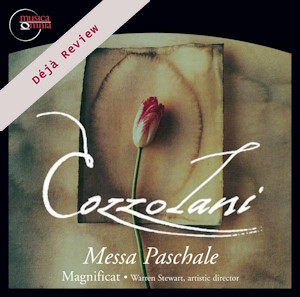Déjà Review: this review was first published in October 2002 and the recording is still available.

Chiara Margarita Cozzolani (1602-c.1677)
Messa Paschale
Magnificat
Ruth Escher, Catherine Webster, Jennifer Ellis, Andrea Fullington (soprano)
Margaret Bragle, Suzanne Elder Wallace, Linda Liebschutz, Deborah Rentz-Moore (alto)
Hugh Davies (celebrant)
John Dornenburg (violone)
David Tayler (theorbo)
Hanneke van Proosdij (organ)
Warren Stewart (director)
rec. 1995-2001
Musica Omnia MO0209 [70]
Chiara Margarita Cozzolani was a Benedictine nun who lived her entire adult life in the Santa Radagonda convent, in Milan. While her music was destined to remain within these walls for centuries, huge crowds came to the convent’s church to hear the “angelic voices” of the nuns who sang Cozzolani’s “passionate and ecstatic music”. This recording, the second in a projected series of the composer’s works, is like the first, Cozzolani’s Vespers, a world premiere.
The liner notes for this disc explain that this is a “reconstruction” of a 17th century musical liturgy, which includes bits of Gregorian chant with works by Cozzolani. In order to “create” this mass, the musicians have taken works from two Cozzolani manuscripts, one published in 1642, the other in 1650.
The result is intimate and extravagant. As in the first Cozzolani recording, we discover texture and tone colors that are both familiar and surprising. The familiar colors of the Monteverdi-style madrigal, and, in fact the entire Italian 17th century song style, are here side by side with a choral texture of surprising delicacy and beauty. Some of the most attractive moments are the sections where several voices sing in harmony, such as the in loco Offertorium: Bene Iesu, fons amoris, where the fine singers of this ensemble, together over a minimal organ accompaniment, show the range and quality of their voices, as well as the beautiful texture they create.
But the soloists are excellent on their own – though they are not credited individually for each track. The fine alto voice that is heard in the in loco Graduale and Alleluia: Ave mater dilectissima. This is rich and earthy; the soprano heard at times in the ad Elevationem: O quam bonum, O quam iocundum, is expressive and enticing. All in all, the eight female voices are delightful individually and, when singing together, admirable.
The sound of this recording is excellent, and all the musicians can be heard almost perfectly. As with other recordings from this young label, sound quality is outstandingly well managed, and the results are top-rate.
Yet another “discovery” from this young label, which confirms the beauty and emotionality of this unknown composer, who, from these releases, will certainly become one of the staples of the Italian 17th century. This is a fine recording, full of beautiful music and musicianship.
Kirk McElhearn
Help us financially by purchasing from





















